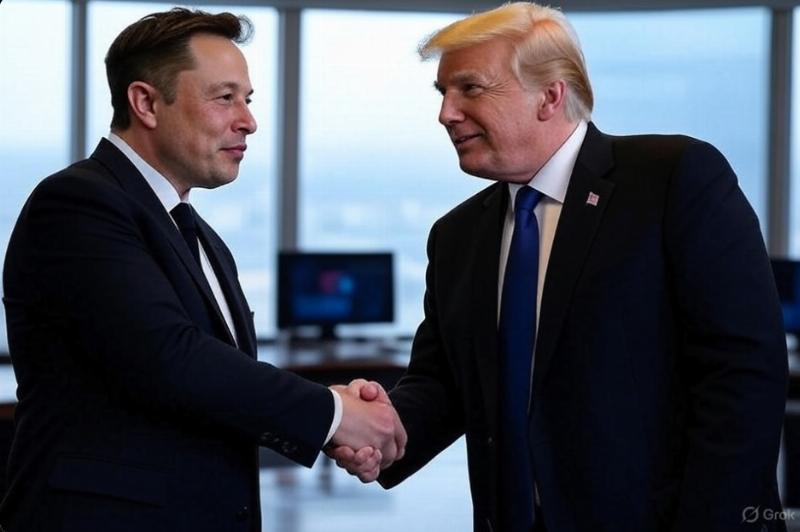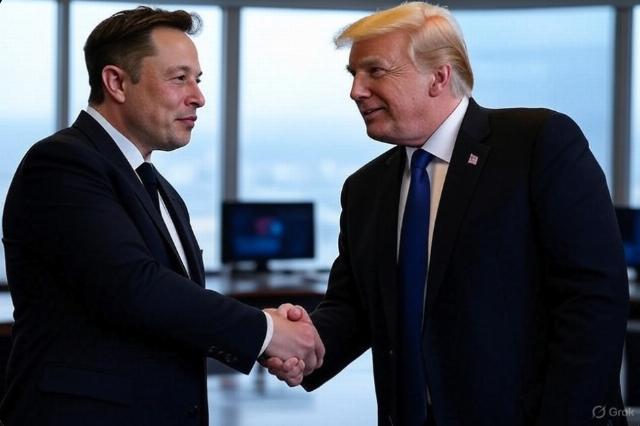


In a mid-20th-century novel, a man details his bad behavior, explains his path of repentance, and apologizes. The woman accepts his apology, to which he asks, “You mean ‘tout comprendre, tout pardonner’?” (to understand is to forgive). Her response is swift. “No.” She adds that merely understanding what a person was thinking means judging what they did, which is not an ordinary person’s role. Instead, repentance is what garners forgiveness: “If people are sorry and show it we should forgive them—but not otherwise.”
I was thinking of that because we recently had two big headline apologies in the news, one from Simone Biles in her spat with Riley Gaines, and another from Elon Musk in his tussle with Donald Trump. The apologies were quite different in tone.

Image created using AI.
It was big news when Simone Biles, the gymnast, attacked Riley Gaines, the swimmer, because Gaines had said that a male Minnesota teen shouldn’t have been allowed on a girls’ softball team that, unsurprisingly, wiped out the competition. Eventually, after Biles accused Gaines of looking like a man, Gaines discovered an old tweet in which Biles acknowledged that she never could have competed and won against a man. It was a knockout blow.
Having been soundly defeated, Biles issued a statement of regret:
I wanted to follow up from my last tweets. I’ve always believed competitive equity & inclusivity are both essential in sport. The current system doesn’t adequately balance these important principles, which often leads to frustration and heated exchanges, and it didn’t help for me…
— Simone Biles (@Simone_Biles) June 10, 2025
I wanted to follow up from my last tweets. I’ve always believed competitive equity & inclusivity are both essential in sport. The current system doesn’t adequately balance these important principles, which often leads to frustration and heated exchanges, and it didn’t help for me to get personal with Riley, which I apologize for. These are sensitive, complicated issues that I truly don’t have the answers or solutions to, but I believe it starts with empathy and respect. I was not advocating for policies that compromise fairness in women’s sports. My objection is to be singling out children for public scrutiny in ways that feel personal and harmful. Individual athletes—especially kids—should never be the focus of criticism of a flawed system they have no control over. I believe sports organizations have a responsibility to come up with rules supporting inclusion while maintaining fair competition. We all want a future for sport that is fair, inclusive, and respectful.
Xoxo Simone ????
You might have noticed that the tweet, which has been treated as an apology, sounds as if it were written by a leftist PR department and ChatGPT. It was less a confession of wrongdoing followed by repentance than a restatement of her original position, along with the implication that, while she may have fallen slightly off the “empathy and respect” track (“it didn’t help for me to get personal with Riley”), Gaines is still wrong, wrong, wrong!! In other words, there’s a throwaway “my bad” buried in that sea of self-justification:
Certainly, others noted that:
You misspelled “I’m sorry, Riley Gaines.”
— Karol Markowicz (@karol) June 10, 2025
Gaines, typically, was gracious in the face of a non-apology apology, but naturally, she also restated her position:Good thing ChatGPT didn’t go down until after it wrote this.
— ????????????????????????Hollaria Briden, Esq. (@HollyBriden) June 10, 2025
Meanwhile, Elon Musk also issued an apology to President Trump. It was clearly not written by either ChatGPT or an expensive PR firm to restate his original position and bury within it an “I’m sorry I got flak for saying what I meant” statement. Instead, it was just an apology. And yes, he didn’t say the phrase “I’m sorry,” but the “I regret...They went too far,” phrasing does fall into the “I did wrong and I’m sorry” category:I accept Simone's apology for the personal attacks including the ones where she body-shamed me. I know she knows what this feels like. She's still the greatest female gymnast of all time.
— Riley Gaines (@Riley_Gaines_) June 10, 2025
A couple of things. Sports ARE inclusive by nature. Anyone can and everyone SHOULD play… https://t.co/V8YbMvs3xf
You know that Musk still hates the Big Beautiful Bill, but he didn’t seek to justify that. Instead, this is about knowing that his attacks on Trump were wrong. And conservatives honored the simple apology:I regret some of my posts about President @realDonaldTrump last week. They went too far.
— Elon Musk (@elonmusk) June 11, 2025
Thank you for setting a positive example. I hope things can be made right with the Administration.
— DataRepublican (small r) (@DataRepublican) June 11, 2025
Takes a real one to apologize ????
— Hodgetwins (@hodgetwins) June 11, 2025
Mistakes are always forgivable if your man enough to admit them. pic.twitter.com/aNxprtUQsu
— David Shapiro (@DavidShapiro98) June 11, 2025
As for Donald Trump, when he gets real apologies, he doesn’t usually hold grudges. Given the tenor of an interview clearly recorded before Elon’s “regrets” tweet, it appears that Trump will be willing to forgive him:
Well, look, I have no hard feelings.
All of this, of course, stands in stark contrast to the leftist ethos, which is that no forgiveness is ever possible. If you are a leftist who transgresses, it’s all over (see, e.g., Roseanne Barr). Leftism is a religion that demands remorse but dismisses repentance and offers no redemption. If you err, leftists will never cease using the jackboot to grind your face into the dirt.
Two quick and relevant updates: The first is this essay about Christian singer Michael Tait's apology, and the second is about Roseanne Barr on the pointlessness of apologizing to the left.
